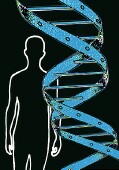
TUESDAY, Sept. 20 (HealthDay News) — People affected by epilepsy are nearly eight times more likely than those without it to develop schizophrenia, and those with schizophrenia are also six times more likely to have epilepsy than people who are not schizophrenic, a new study suggests.
Researchers in Taiwan say this two-way relationship between the two conditions may be due to genetic, environmental or neurobiological causes.
After analyzing information on almost 5,200 patients with schizophrenia and more than 11,500 patients with epilepsy and controls matched for age and sex in both groups, researchers found the prevalence of epilepsy was higher in the schizophrenia patient group at about 7 per 1,000 person-years, compared to just over 1 per 1,000 among those not affected by schizophrenia.
Meanwhile the study, published in Epilepsia, showed the prevalence of schizophrenia was about 3.5 per 1,000 person-years for patients with epilepsy, compared to about 0.5 among those without epilepsy. The researchers noted the incidence of schizophrenia was slightly higher among men with the disease than women.
“Our research results show a strong bidirectional relation between schizophrenia and epilepsy,” said the study’s lead author Dr. I-Ching Chou, an associate professor with China Medical University in Taichung, Taiwan, in a journal news release. “This relationship may be due to common pathogenesis in these diseases such as genetic susceptibility and environmental factors, but further investigation of the pathological mechanisms are needed.”
More information
The National Institutes of Health provides more information on schizophrenia and epilepsy.

